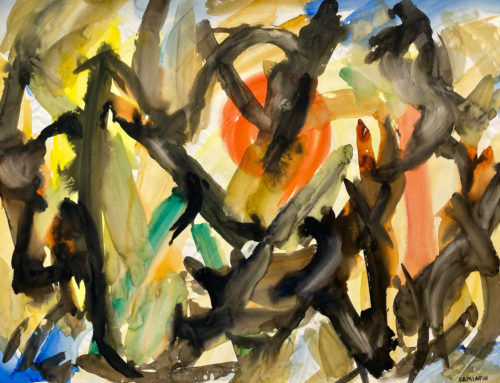How does self-quarantine look for New York Times bestselling author Tod Goldberg? His new essay “The Outside In,” which won a $500 grant from the California Desert Arts Council (CDAC) to “keep art alive,” brings you into his stir craziness.
“’The Outside In’ [below] is a piece of narrative nonfiction which examines this strange new world we live in — with each other, without each other, and with the animals and people we too often ignore,” says Goldberg, a professor of creative writing at UC Riverside’s Palm Desert campus, where he founded and directs the Low Residency MFA in Creative Writing & Writing for the Performing Arts.
CDAC and La Quinta Arts Foundation established a $50,000 Keep Art Alive fund to award grants to local artists and arts organizations who create thoughtful, inspiring, and relevant works responding to the crisis.
Goldberg, author of more than a dozen books, is co-host of Literary Disco, named one of the best podcasts in the nation by the Washington Post, and Open Book on KCOD. His next book, The Low Desert, will be released in 2021.
THE OUTSIDE IN
By Tod Goldberg
THERE’S A MAN standing in my living room.
It’s just after nine in the morning, I haven’t left my house in a month.
Maybe it’s less than a month. Maybe it’s more than a month. Time has begun to melt and shift in unusual ways, my dreams filled with my dead mother, telling me to come inside, that it’s not safe to play catch in the yard with the Hayworth boy, a memory from 40 years ago reanimated, night after night, as a neurological filmstrip. Outside, a bright blue late April, it is already ungodly hot. A driving wind howls through the pass, shakes my windows, squeals beneath our doors, swirls down our chimney. The dog stares at the ceiling as though it might lift off, then rushes out her dog door, where I’m not sure it’s any safer.
“I’m going for a run,” my wife, Wendy, told me fifteen minutes ago.
Since we’ve been inside, the outside has been a luxury. I spend an hour each day in my backyard, walking in circles, because I’m too afraid to walk on the streets, even though they are empty. The Governor says I should stay in my home. I take him literally. I have no desire to die for Starbucks, though already I would kill for it. Wendy has less fear than me.
“In this wind?” I said.
“It’s the least of my concerns,” she said.
***
Every morning, beginning when the sun rises, a bird attacks our house. The bird is acting on its territorial instinct. It’s building a nest. It’s spotted another bird. Or what it thinks is another bird. It’s merely its own reflection, in the same spot, every morning. But still. The bird’s territory has been invaded. I wake up, my dead mother still alive in my head, and see the bird launching itself against our picture window. The bird pecks at its reflection, wings beating furiously against the glass. It sounds like someone is pelting our house with rocks.
At first, I thought the bird was trying to get in, like that nursery rhyme from a previous plague:
There was a little girl, and she had a little bird,
And she called it by the pretty name of Enza;
But one day it flew away, but it didn’t go to stay,
For when she raised the window, in-flu-Enza.
Now that I know what’s happening, I’ve tried to figure out how to stop it. I’ve lined dog toys along the windowsill – scarecrows made of pink dragons, bright yellow frogs with their heads chewed off, a cow which moos when squeezed, a stuffed comfort toy that has a battery powered beating heart, an old sleeping companion for our now-grown puppy for the nights she was confined to a crate – but nothing works. Every fifteen minutes, the bird returns. You’re going to break your neck over your own reflection, I tell the bird. Don’t die an ironic death. Not now. But the bird doesn’t listen to me. It flies off when I open the sliding door, sits on our fence, stares at me. I take a step inside. It hurls itself at the house. In and out. In and out. Over and over again, both of us stuck on a loop. Come inside. We’ll trade places.
***
The man standing in my living room?
He’s still there.
I just haven’t noticed him yet. The bird has my attention. And then the wind. I watch as it bends the towering ficus trees which surround our yard. They are fifteen feet tall. We grew them for privacy, which is absurd since our backyard opens to the 13th fairway of a golf course, but also because I have no inclination to know my neighbors, with or without a physical barrier. I spend a great sum of my professional life speaking to strangers and want my home life to be, in fact, my private life.
It has taken the ficus ten years to reach their present height, but the wind is so fierce this morning, I wonder if they will snap in two. Already the yard is covered in white petals from the roses we’ve groomed so assiduously. The wind gusts and a fresh wave of petals pull from the manicured bushes, hang in the air, fall to earth, our lawn a wedding reception.
A hundred yards away, countless seagulls have lit upon one of the golf course’s ponds. It’s been like this for a few weeks now. Once the final golfers left, the seagulls arrived. They chase each other down the fairway, a blur of white against the azure sky and the deep green of the still-manicured grass. At sunset, the seagulls lift off en masse from the pond and disappear into the shadows of the golden mountains to the north.
It hasn’t taken nature very long to get acclimated to the absence of us. The howling of coyotes, somewhere on a distant putting green, have pulled me from sleep too many times to count this week, this month, however long it has been. But the coyotes have always been here. They’re the one animal which seems impervious to people in these parts, news stories come out every year around this time about how easily they can scale our backyard fences. Yet in the decade I’ve lived in this house, as the ficus have gone from stakes in the ground to these bending green monsters, I’ve never seen so many birds. Not merely the seagulls. In the morning, turkey vultures slow walk the driving range, while the evening sky routinely fills with birds in mumuration, the sunset glimpsed between their wings, a crescent of moon above them.
The truth is, I prefer the birds to the golfers. I will miss them more when this is all over than I will welcome the men and women who stand feet from my house and talk too loudly about their politics. Even when I agree with them, I just want them to be quiet. Not for any silly notions about the gentle nature of the game they play. No. I want them to respect this place, the silence of the sand, the history beneath their feet, the memory of when this land was more than their plaything.
***
I close the sliding glass door. I sit down at my table. I open up the newspaper. It’s yesterday’s news. Today is already worse. Thirty thousand. Forty thousand. One hundred thousand. A curve that flattens horror into despair. The wind rattles the house. My dog is still outside. She chases something into the ficus, disappears, she’s slipped through a portal.
Take me with you.
Something moves into my peripheral vision.
I’m so tired.
I’m so sad.
I feel so lost, I half expect that I will turn and find my dead mother, back for another round, here in the light of day.
But it’s not her.
In my living room is a man.
He’s tall. Over six-foot.
He has a shock of grey hair that the wind has blown wild.
He’s wearing pajamas.
He stands very still.
***
Lately, our HOA message board has been alive with the same question, every Tuesday: “Is anyone missing a garbage can? I somehow now have an extra garbage can.”
And then one Tuesday, it is our turn. An extra garbage can in front of our house. I slide it to one side. It sits there for a week. One day, it’s gone. Like it had never been there before.
The following week, I go outside to get the newspaper and my next-door neighbors – an elderly couple who I smile and wave at, who I speak to every Halloween when they sit in lawn chairs on their driveway, but who I generally never see otherwise – have six garbage cans in front of their house.
That afternoon, Wendy goes out to get the mail. But she’s gone longer than usual. When she comes back, I can tell she’s upset.
“Our neighbor, the man next door?” she said. “He was lost. Couldn’t find his house. So I walked him home.”
The next morning, a garbage can appears in front of our house. It is there for days until a woman I don’t recognize drags it off, down the long block and around the corner.
***
I’m surprised by my calm.
“You’re in the wrong house,” I say.
“Am I?” he says.
“Yes,” I say. Our front door is wide open. The wind gusts through. I look behind me, to my yard. My dog is still inside the ficus, maybe gone to Narnia. A dozen years ago, in a neighborhood a few miles away, I walked into my mother’s house and found her nude, wandering lost, looking for men she’d dated in the 1970s, for the bandleader Artie Shaw, for our dog Sam, dead thirty-five years by then. When I tried to corral her, she swung her fists at me, made a noise in her throat like she was choking on glass. I have never forgotten how scared she was. So I approach the man with caution. “I know where you live. Don’t worry.”
He nods. Says, “I am not myself.” Looks around. “Have we met before?”
“We have,” I say. “It’s okay. It’s a weird time.”
He says, “Why?”
I can’t tell him the world has gone sour. I can’t tell him that my mother, absent from my dreams for years, has shown back up to let me know it’s not safe outside. I can’t tell him that being around other people could kill him.
“The wind,” I say.
He says, “Oh. Yes. The wind. That’s what it must be.” He stares at his feet. “I think I forgot my medication.”
I say, “Why don’t you let me take you home.”
The bird slams into our house.
***
There’s a philosophical theory called “terror management.” It posits that our entire lives, from the creation of our religious devotion to the existence of social institutions – everything from God to baseball to Good Morning America – are devoted to managing our fear of mortality. The fact is, I don’t fear dying. I fear suffering, which is why I have not left my house. I fear the forfeiture of self that would find me standing in another man’s home, transient in my own existence. I fear wandering my own neighborhood, in the middle of a plague, collecting strangers’ garbage cans, dragging them down the street in the middle of the night.
I fear who would find me, drifting inside my own home, looking for everyone I’ve ever loved.
***
The man standing in my living room is now the man standing in front of his own door. Our houses are separated by a strip of grass and a driveway. The trip has taken us seconds. A minute at most.
“You live here,” I say. I point at the door. “This is your home.”
“It is?”
“It is,” I say. He seems skeptical. “You can go in.”
“It’s so close.”
“It’s easy to get confused,” I say. “Everything looks the same.”
“Thank you,” he says. He puts his hand out.
I want to shake it.
I do.
A few weeks before all of this, an old friend emailed me to tell me a story.
She’s in her early forties. Lives in Florida. She has cancer.
She could live six months, she could live twenty years.
That day, a cop pulled her over for speeding. He asked her why she was going so fast. She told him she was losing her hair that day, due to chemotherapy, and wanted to feel the wind in it just one more time, before it was all gone. So she was speeding, with the windows down. She ran her fingers through her hair and showed the cop all the strands that came lose between her fingers.
The cop ordered her to get out of her car.
As she stood on the side of the highway, the cop hugged her.
He hugged her and said he was sorry but that she should try not to speed.
She should try not to die today.
He told her going eighty-nine in a sixty-five is dangerous. He told her to slow down and appreciate the beauty of the day.
“Don’t die today,” he said. “Kick that cancer’s ass.” He let her go. Didn’t even ask for her ID. Just got back in his cruiser and left.
I wish my terror management would give me the same courage.
I say, “I’d like to shake your hand.”
I stop. Because I don’t know the other side of the sentence.
Because I could be his hangman.
Because I’m willing this man, who lives in the same house as mine, a mirror image, mere feet away, to try not to die today.
So I say, again, “I’d like to shake your hand. But I’m sick.”
My neighbor says, “I’m sick, too.”
***
There’s a knock at our locked door. It’s been two weeks. It’s been a month. It was yesterday. I look through the peephole. The man from my living room is standing on my front porch, in his pajamas, holding a newspaper. It’s four o’clock in the afternoon. It’s 106 degrees today. It’s the time of year hikers die of exposure in these parts, because they don’t know what we know: The desert is always waiting for you.
“I wanted you to know I’m better now,” he says when I open the door.
“That’s good,” I say. “That makes me happy.”
“I went out to get my paper,” he says. He shows it to me. “But I can’t seem to find my way home.”
“Do you want me to take you?” I ask.
“Yes,” he says. “If you wouldn’t mind.”
I walk him outside. There are garbage cans in strange places on the street. I’ll post something on the message board. It’s my turn. He follows me to his home, once more. “Here you are,” I say.
He looks at the house. He looks at the street. “Not many people out here lately,” he says.
“It’s better to stay inside,” I say.
“Better to not let the outside in,” he says and then disappears into his own house, for how long, I do not know.







